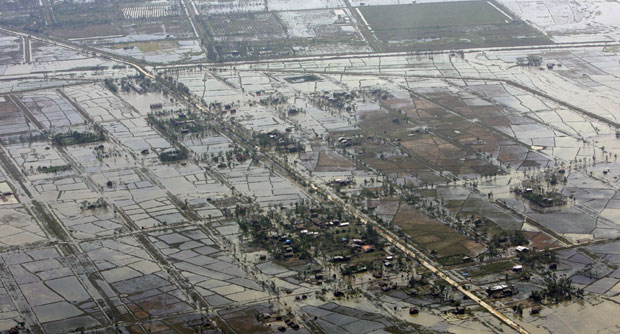Climate change boosts conflict risk, flood, hunger–UN

This May 6, 2008 file photo, shows an aerial view of devastation caused by Cyclone Nargis, seen at an unknown location in Myanmar. Global warming is driving humanity toward a whole new level of many risks, a United Nations scientific panel reports, warning that the wild climate ride has only just begun. AP
YOKOHAMA, Japan – Soaring carbon emissions will amplify the risk of conflict, hunger, floods and migration this century, the UN’s expert panel said Monday in a landmark report on the impact of climate change.
Left unchecked, greenhouse gas emissions may cost trillions of dollars in damage to property and ecosystems and in bills for shoring up climate defenses, it said.
The report said the impact of climate change was already being felt and would increase with every additional degree that temperatures rose.
“Increasing magnitudes of warming increase the likelihood of severe, pervasive, and irreversible impacts,” a summary said, in a stark message to policymakers.
The report is the second chapter of the fifth assessment by the Intergovernmental Panel on Climate Change (IPCC), set up in 1988 to provide neutral, science-based guidance to governments.
“It’s a toolkit for managing climate change, but it also provides a framework for understanding, a mindset for understanding climate change and its implications,” Chris Field of the Carnegie Institution, co-chairman of the group of scientists who authored the document, told AFP.
These hefty documents — running to thousands of pages — have a political impact that can resound for years.
The last overview, published in 2007, earned the panel a co-share in the Nobel Peace Prize and unleashed a wave of political action that strived, but failed, to forge a worldwide treaty on climate change in Copenhagen in 2009.
The new document, unveiled in Yokohama after a five-day meeting, gives the starkest warning yet by the IPCC of extreme consequences from climate change, and delves into greater detail than ever before into the impact at regional level.
It builds on previous IPCC forecasts that global temperatures will rise 0.3-4.8 degrees Celsius (0.5-8.6 degrees Fahrenheit) this century, on top of roughly 0.7 Celsius since the Industrial Revolution.
Seas will rise by 26-82 centimetres (10-32 inches) by 2100.
Warming of around two degrees Celsius over pre-industrial times may cost 0.2-2.0 percent of global annual income, said the new report. UN members have pledged to hammer out a global pact by the end of 2015 to limit warming to 2 C.
Security risk
The impact amplifies with every degree and beyond 4 C could be disastrous, said the report.
Climate change can drive turbulence and conflict, prompted by migration from newly uninhabitable areas and jockeying for water and food, it said.
“Climate change has a tendency to act as a threat multiplier whatever the current range of stressors is,” said Field.
“There are many things that make people vulnerable, and when you combine a climate shock with these factors, you can have bad outcomes.”
Rainfall patterns will be disrupted, resulting in a significantly higher flood risk, especially for Europe and Asia — and magnified drought risks will add to water stress in arid, heavily populated areas.
This, in turn, will have consequences for agriculture. Yields of staples such as wheat, rice and corn will be squeezed, just as demand will soar because of population growth.
Climate change will also have a ricochet effect on health, through the spread of mosquito or water-borne diseases and heatwaves.
Vulnerable plant and animal species, especially in fragile coral reefs and Arctic habitats, could be wiped out.
Adding a further grim layer to the warning, the report said the most vulnerable ecosystems faced a potential “tipping point” that could pitch them into unstoppable decline.
The report said the danger can be substantially reduced, especially for those alive at the end of the century, if greenhouse-gas emissions are cut swiftly.
Even so, countries will have to shore up their defenses — for instance, by making water supplies, coastal areas, homes and transport more climate-resilient.
Poor, tropical nations will be hit harder than rich countries in temperate zones.
Many of the measures for adapting to climate change are easy and cheap, said the report.
They include reducing water wastage, planting parks to ease heat build-up in cities, and preventing people from settling in places that are exposed to extreme weather events.
RELATED STORIES
Lights out for iconic landmarks on Earth Hour
Climate change kills the poor first














